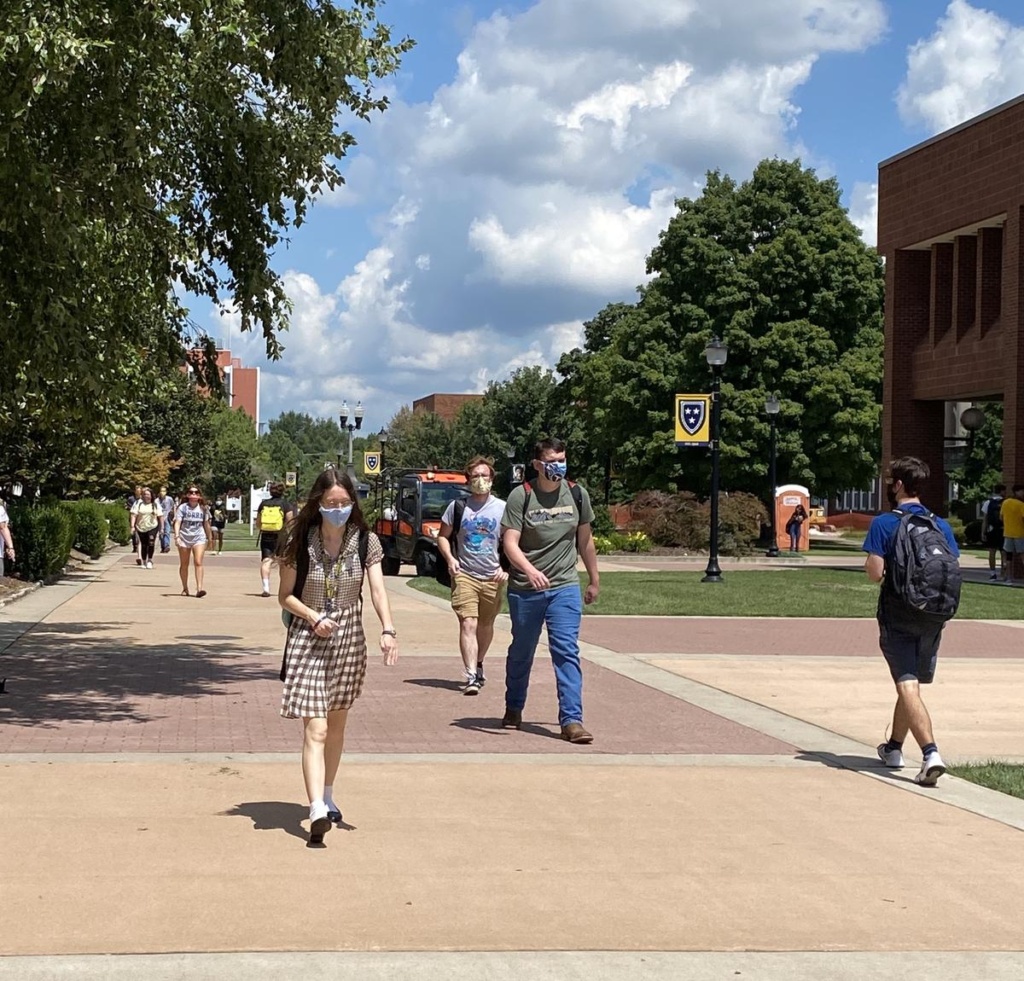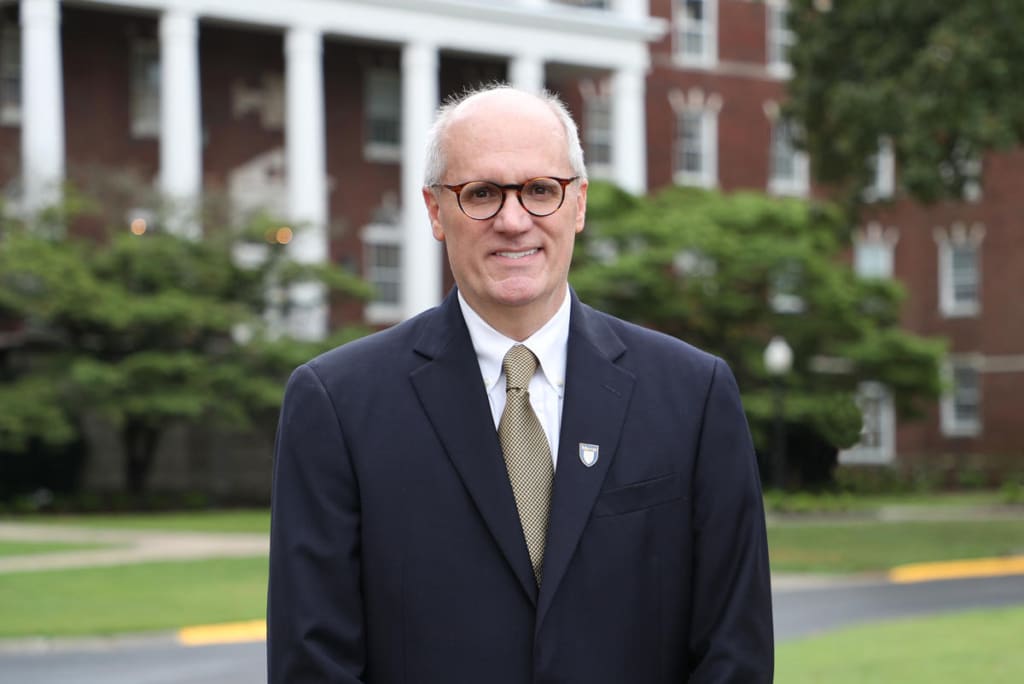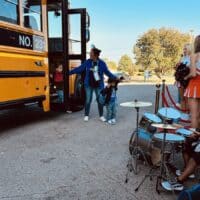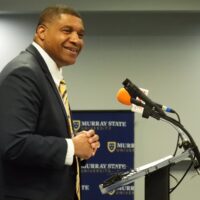Murray State University is beginning its second week with students on campus, and MSU President Bob Jackson tells WKMS despite a few hiccups, things are going well overall. He said he hopes the combination of students and staff adhering to the Racer Restart health measures and “making good choices” will result in the university’s ability to complete the fall semester in-person.

(WKMS photo by Rachel Collins.)
Jackson noted mask-wearing on campus is mandatory for all students, faculty and staff, and the university has put in place several measures to promote social distancing and proper hygiene/sanitation.
“I keep telling our students that I’m not so concerned about what happens in the daytime. It’s the nighttime of making good choices that’s really important to our students. I want to be here on Nov. 20, our last day of classes. I want our students to be here on Nov. 20. And I want our faculty and staff to be here on Nov. 20, on this campus, in a safe and healthy way. And I think if anyone can pull it off, Murray State University can, but it’s going to take everyone working together for the common good of all to make this happen.”
Jackson said one of the measures MSU put in place to promote social distancing may stick beyond the pandemic: staggered move-in for dorms. He said students had to reserve a two-hour time slot over a one-week period during which they could move in. He said it was so successful and efficient, it’s a measure they’re considering keeping long term.
MSU last week began specifying active cases on campus from countywide numbers reported by the Calloway County Health Department. Jackson said the university will report the active case numbers on a weekly basis, each Monday, on the Racer Restart webpage. The cases are separated in categories by students and faculty/staff. He also noted the university had, since the beginning of the pandemic, been reporting numbers to the local health department and other required agencies; he said the university now works with the local health department to highlight the university-specific positive case numbers in light of new guidance from the state (which is noted in the Aug. 20 campus update).
Michigan State University, the University of Notre Dame and University of North Carolina at Chapel Hill changed direction of their fall semesters after coronavirus outbreaks struck their campuses within one or two weeks of starting in-person classes, switching to online-only for a short period of time or for the remainder of the semester. Jackson said MSU has contingency plans in place in case of an outbreak, but hopes not to pull them out of the playbook.
“We do have a contingency plan for really just about any option we can think of in regard to this semester. This is a very abnormal period in our history. Very few people living have been through a pandemic. The last one happened over 100 years ago. So there’s no playbook. And so we’re writing it, and we’re writing it for the next pandemic and I hope it’s 100-plus years from from now because I cannot go through another one,” he said. “This is a tough duty on all of us, all faculty and staff and our administrators. And some of us, many of us have been on this campus 24/7, and I really mean 24/7 since February. This is a massive undertaking.”

But Jackson said over the course of move-in and the beginning of fall semester, he didn’t meet one student (or family member) who wasn’t excited to be back on campus. He said all the measures in place to reopen and keep open campus are owed to those students.
“Students want a traditional, on-campus college experience, and we owe that to them,” he explained. “It’s very simple; we’re here because of our students. And we have a great responsibility to them, and to our region, and to our state and this multi-state region. It’s a tremendous responsibility. And you know, we, and I, take that very seriously. So I’m very pleased with how everything has worked out the last few weeks.”
MSU recently announced the first four recipients of the Regents Fellowship, a career enhancement program for minority graduate students who want to pursue careers in higher education. Jackson said the program is the product of a task force he put together in 2019 with the goal of recruitment and retention of underrepresented minority faculty, staff and students.
“We have four really, really sharp graduate students. They will be assigned vice presidential areas to work in, or the president’s office area, and it’ll be a wonderful experience for them. Some of them are getting master’s degrees, some of them are looking to get doctorates here at Murray State,” he explained. “I think it’s going to help us in the future, recreate and develop that pipeline so we make sure that we’re doing what we should be doing in this area, in addressing the needs of underrepresented minority population, and especially the area of recruiting and retention of our faculty, staff and students in these areas.”
In July, Kentucky Governor Andy Beshear announced Jackson was appointed to join the 21-person AgriTech Advisory Council task force with the goal of developing agriculture technology opportunities. Jackson said during the first meeting last week the council, chaired by Beshear, spent the majority of that meeting setting goals and discussing direction for what Jackson called a “major economic development initiative.”
“I’m honored to represent Murray State University,” he said. “I’ll bring the voice of the west [region of Kentucky] to the rest of the task force … I’m very proud of also how this fits in with Murray State and the Hutson School of Agriculture. Dean [Tony] Brannon, his faculty and staff have done a fantastic job already doing some really creative things; creating the Center for Agricultural Hemp is one of them, but agritech fits in perfectly.”
Jackson explained agritech is “the intersection of technology in agricultural efficiencies,” and learning how to make agriculture more efficient and more effective while bringing technology into the equation. He said there are a number of companies in Western Kentucky that are already working in that direction and one of the AgriTech Advisory Council’s goals is making Kentucky a “friendlier” state from the perspective of economic development to recruit and retain more of those companies.
“Kentucky’s perfectly situated with the river industry, with our transportation hub that we’ve become and if you look at our geographic location in this country, we’re perfectly situated to really be successful in this area,” he added. “So I’m excited about it. I’m excited for the state and I’m excited for what it means for Western Kentucky.”






